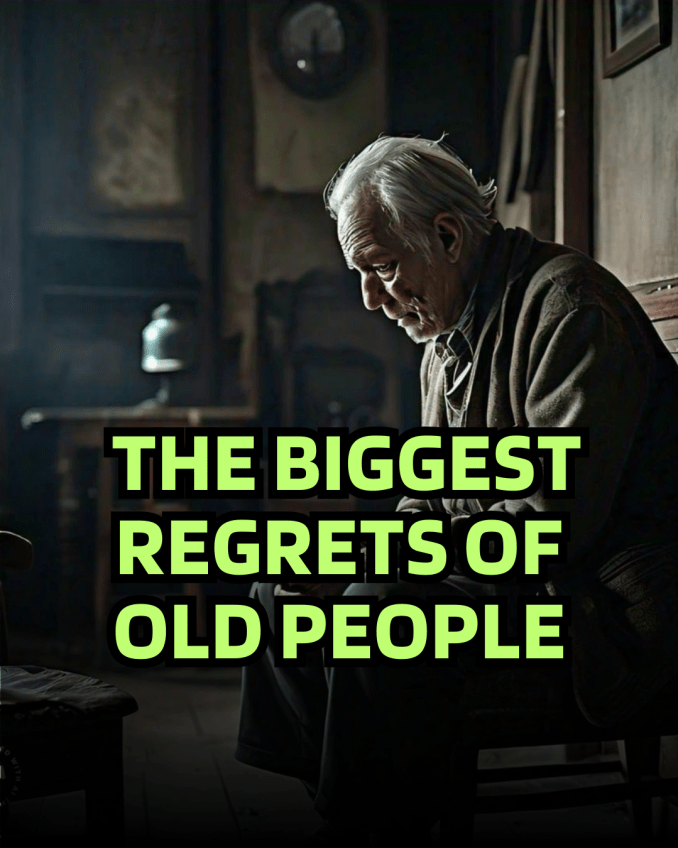As people grow older, they often gain wisdom that only a lifetime of experience can offer. When they reflect on their lives, certain regrets tend to come up repeatedly. If you’re younger, these insights can offer invaluable lessons on what matters most in the end and where to focus your time, money, and energy now to avoid looking back with remorse. Here are some of the biggest regrets older people frequently share, along with practical advice on how to avoid them.

Not Starting a Business
Many people regret not pursuing the dream of starting their own business. While entrepreneurship may come with significant risks, it also provides freedom, personal growth, and the chance to create something meaningful. For those who never took the leap, the regret often isn’t about failing but about never trying.
How to Avoid This Regret:
Consider starting small or part-time if a full commitment seems daunting. Think of your business idea as a journey rather than a goal, embracing the learning experiences along the way. You don’t have to leave your current job right away; side gigs or freelance work can help you explore entrepreneurship without feeling the full weight of risk. Additionally, planning and budgeting wisely can give you a solid foundation, reducing the fear of failure.
Not Having a Healthy Body
Many older adults express regret over not prioritizing their health earlier in life. A body that’s strong and fit makes a difference in daily activities, mental sharpness, and overall happiness as you age. Neglecting physical health in favor of other pursuits often leads to a decline in mobility, increased health complications, and reliance on others.
How to Avoid This Regret:
Build a health routine that you can sustain long-term, focusing on exercises you enjoy, from walking and swimming to yoga or strength training. Eating nutrient-rich foods, staying hydrated, and getting adequate rest are fundamental. Your future self will thank you if you commit to regular health checkups and take preventive actions now, as a healthy body provides freedom and independence later in life.
Not Saving for Retirement
Not saving for retirement is a frequent regret because, without sufficient funds, financial freedom in old age becomes limited. Social security or pensions might not be enough to cover rising living costs or medical bills, and depending on family can feel burdensome. Those who didn’t prioritize retirement savings often express feeling trapped or financially insecure in their later years.
How to Avoid This Regret:
Start saving for retirement as soon as possible, even if you’re only able to set aside a small amount. Compound interest means your money will grow faster the earlier you begin. If your workplace offers a retirement plan with matching contributions, maximize that benefit. If you’re self-employed, research retirement accounts like IRAs or Solo 401(k)s. Make regular contributions and avoid dipping into these funds, and you’ll build a safety net that will help ensure a comfortable retirement.
Not Investing in Stocks or Real Estate
While traditional savings are important, many older adults regret not leveraging investment opportunities. Stocks and real estate can offer higher returns than savings accounts or bonds, building wealth over time that provides financial stability and flexibility. Those who didn’t invest often find they missed out on potentially lucrative opportunities.
How to Avoid This Regret:
Learn the basics of investing in stocks, bonds, and real estate. Start with what you’re comfortable with, and gradually increase your knowledge and portfolio as you gain confidence. Diversifying investments spreads out risk and allows you to weather economic ups and downs better. You might consider working with a financial advisor, especially if you’re unsure where to start. Building a well-balanced investment portfolio can yield rewards that bring security and peace of mind in your later years.
Not Spending Enough Time on Yourself and Family
Work commitments and other responsibilities often overshadow time with family, friends, and personal interests. Many older adults regret not carving out time to pursue hobbies, travel, or simply relax. This regret isn’t only about personal well-being but about missing valuable moments with loved ones.
How to Avoid This Regret:
Start prioritizing self-care and personal relationships now. Schedule regular family time, whether through weekly dinners or monthly outings. Pursue hobbies and interests that bring you joy, and resist the temptation to overwork or let work become all-consuming. Remember, life is about balance, and taking time for yourself and loved ones is as crucial as career accomplishments.
Not Expressing Feelings
Older adults often express regret over not sharing their true feelings—whether it was telling loved ones how much they meant to them or being honest in difficult situations. Holding back can lead to misunderstandings, strained relationships, and unspoken emotional burdens.
How to Avoid This Regret:
Make a habit of communicating openly with those you care about. This doesn’t mean expressing every thought or feeling but sharing what’s meaningful. Regularly show appreciation, apologize when necessary, and resolve conflicts sooner rather than later. These acts of honesty not only strengthen bonds but also provide a sense of inner peace and closure.
Live a Life You Don’t Regret
Each of these regrets is a powerful reminder of the importance of living intentionally. Instead of waiting until later in life to realize what truly matters, you can incorporate these lessons now. By making small changes, you can set a course for a life that’s rich, fulfilling, and full of meaning, so you can look back one day with satisfaction rather than regret.